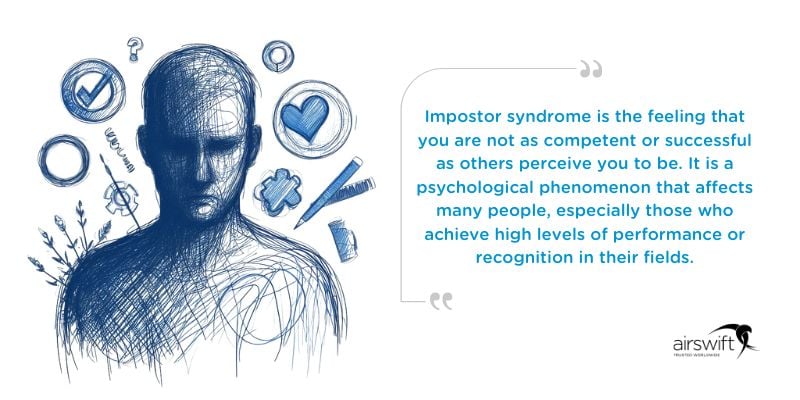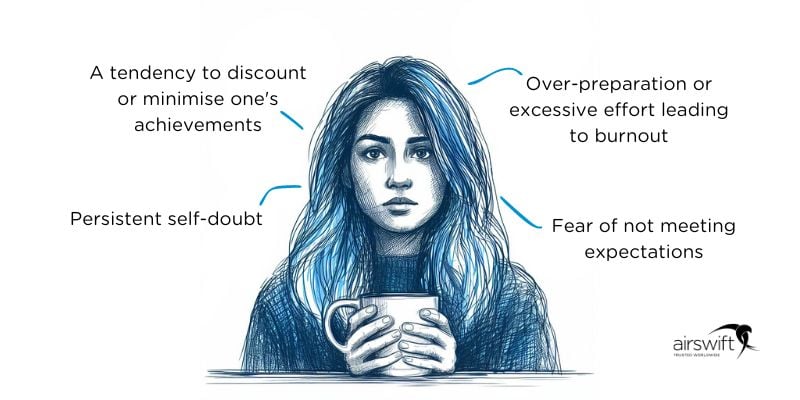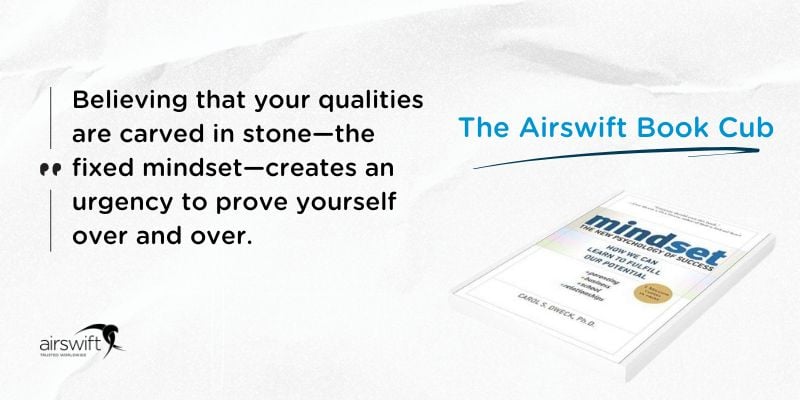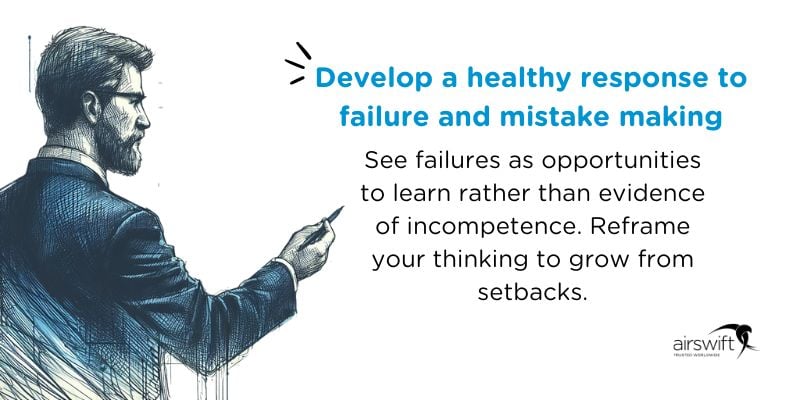
By
Raphael Santos
February 29, 2024
Updated
June 27, 2024
The best way to start talking about impostor syndrome is by addressing its definition:
a psychological pattern where individuals doubt their accomplishments and harbour a persistent, often internalised fear of being exposed as a "fraud".
Despite external evidence of their competence, those experiencing this phenomenon can't shake the feeling of being imposters.

This challenge knows no bounds, striking individuals at every level of achievement, from prodigies students to top-tier executives.
Understanding impostor syndrome
In other words, impostor syndrome is the feeling that you are not as competent or successful as others perceive you to be. It is a psychological phenomenon that affects many people, especially those who achieve high levels of performance or recognition in their fields.

If you're constantly battling anxiety and perfectionism, you've likely found yourself stuck in that trap of feeling unworthy and undeserving of your achievements.
Overcoming impostor syndrome involves a blend of self-awareness, behavioural changes, and cognitive strategies. Identifying the symptoms early on is vital, as they can show up in various forms, such as reluctance to speak up, over-preparing for tasks, or attributing success to luck rather than ability.
By tackling these feelings head-on, individuals can begin the journey toward regaining confidence in their capabilities and recognising their rightful place as capable contributors to their fields.
Strategies to beat impostor syndrome are accessible and varied, with solutions tailored to the uniqueness of each individual's experience. Effective methods consist of gathering evidence of one's achievements, seeking support, and re-framing a mindset about success and failure.
These approaches can support you in building a realistic perception of your abilities, empowering you to own your success and move forward with conviction.
What is imposter syndrome at work: Common triggers

Key triggers for impostor syndrome include new challenges, such as starting a new job or receiving a promotion. Situations where one's abilities are showcased or evaluated, like presentations or performance reviews, may also provoke symptoms. Common experiences among those suffering from impostor syndrome involve:
- A tendency to discount or minimise one's achievements
- Persistent self-doubt
- Fear of not meeting expectations
- Over-preparation or excessive effort leading to burnout
Recognising these triggers and experiences is a crucial step in addressing impostor syndrome at work effectively.
Strategies to overcome impostor syndrome at work
To effectively combat impostor syndrome at work, individuals can employ specific strategies that foster a positive self-perception and help build resilience. These methods provide practical steps to address common feelings of self-doubt.
Avoid a fixed mindset, embrace growth
A growth mindset, believing that one's abilities and intelligence can be developed with effort, is a powerful tool against impostor syndrome. Individuals should focus on learning from experiences rather than seeing them as pass-or-fail scenarios. Recognising that skills are not fixed but can be improved through perseverance and hard work helps to mitigate feelings of being a fraud.
We can always go back and listen to what Carol Dweck says about this. Dweck's work, encapsulated in her seminal book — one of the best books on impostor syndrome —, "Mindset: The New Psychology of Success," delves into how our beliefs about our abilities influence our behaviour, approach to challenges and, ultimately, our success.

She posits that adopting a growth mindset, the belief that our basic qualities are things we can cultivate through effort, unlocks a passion for learning and a resilience essential for achieving great accomplishments.
She advises that a fixed mindset can trap individuals in a cycle of avoidance, where the fear of failure and judgment overtakes the desire for growth. Her findings suggest that how we interpret our experiences and the mindset we adopt in response to challenges significantly influence our potential for learning and growth.
This is a powerful reminder that the path to personal development and achievement is not fixed but is profoundly shaped by our mindset and attitudes.
With that in mind, you’ll have an even more profound desire to seek out new learning experiences, like stretch assignments that challenge you to learn new skills, take on new responsibilities, and expand your network.
Redefine success and failure through self-compassion
Dr. Valerie Young, an expert on impostor syndrome and author of "The Secret Thoughts of Successful Women," emphasises the importance of redefining what success and failure mean to you. She suggests viewing failure as a part of the learning process and success as the result of effort and growth, not just innate talent.

So, to thrive in this, it's imperative to cultivate self-compassion, which means treating yourself with kindness, especially when faced with setbacks or during times of failure or inadequacy.
Instead of harsh self-criticism, individuals should treat themselves with the same kindness they would offer to a friend. After all, even that friend might be dealing with impostor syndrome at work.
Embracing self-compassion addresses the punitive narrative of impostor syndrome and encourages a nurturing and understanding view of oneself.
Celebrate your achievements, especially the intangible ones

Individuals must acknowledge their successes and attribute them to their efforts and abilities. By maintaining a record of positive feedback and completed goals, they can see tangible proof of their competencies. This evidence helps to counteract the unfounded belief that they do not deserve their achievements. That could be a big game-changer in overcoming fear that holds you back in specific situations like, for instance, negotiating your salary.
Again, this is also something that Dr. Valerie Young stresses. She suggests actively challenging invasive thoughts by gathering evidence of your competencies and successes. Keeping a success journal or feedback file can remind you of your abilities and achievements.
Be mindful that your achievements may not fully reflect your contributions. It's essential to appreciate both the visible and invisible outcomes of your efforts. Remember, the true value you add to your role and others go beyond mere achievements or the fear of failure. Shifting your focus this way can lessen the pressure to be perfect.
Accept that perfection is unattainable
Understand that making mistakes and not knowing everything is part of the learning process and human experience. Allow yourself to be imperfect.

- Stop comparing yourself to others. Remember that social media and professional settings often showcase only the highlights of someone's life or career. Focus on your path and progress.
- Set realistic expectations. Set achievable goals and celebrate when you reach them. Recognising your successes is crucial in overcoming impostor syndrome at work.
- "Don't finish, give up". While this statement has undertones of clickbait content, it’s a common phenomenon among many musicians who grapple with the relentless pursuit of perfection in their work. Often finding themselves in a continuous loop of reviewing and adjusting their compositions and arrangements. It is important to acknowledge that there is always room for improvement in creative processes, so meeting deadlines and being realised with the outcome can make a significant difference.
One more critical strategy: Build support systems
In combating impostor syndrome at work, one's environment plays a critical role. Building support systems that include mentorship and positive relationships can be instrumental in managing self-doubt and fostering a realistic appraisal of one's achievements.
Seek out mentorship
Seeking the guidance of a mentor can prove invaluable in overcoming feelings of fraudulence. A mentor offers not only expertise but also an outsider's perspective on one's progress and accomplishments.
They can provide constructive feedback, set realistic expectations, and help individuals recognise and celebrate their successes.
A mentor's reassurance can help to demystify the accomplishments and reinforce that one's skill set is genuine and valued.
Foster positive relationships with peers and colleagues
Establishing and maintaining genuine connections and relationships with peers and colleagues can also be a foundation for a robust support system.
These relationships create a network of support that can offer encouragement, share similar experiences, and remind one that they are not alone in their feelings. It's beneficial to surround oneself with individuals who acknowledge one's abilities and contribute to a supportive environment that combats the negative internal dialogue associated with impostor syndrome.
In a nutshell, sharing your feelings of impostor syndrome with trusted friends, mentors, or colleagues can provide a sense of relief and belonging.
Take the next step in your career with Airswift and recognise your value
Now that you’re well-equipped with the strategies to overcome impostor syndrome at work, what's next? How do you put those newfound skills to the test in real-world scenarios?
This is where Airswift comes in. We are a global leader in connecting talented professionals with top-notch employers worldwide. With over 60 offices, 9,000 contractors, and 1,000 employees, our expansive network is your ticket to finding the perfect role that aligns with your ambitions.
Are you searching for a permanent position, craving the flexibility of contract work, or aiming to excel in a remote setting? Sign up with our candidate portal today to discover the latest jobs in the engineering and technology sectors and unlock your potential.


